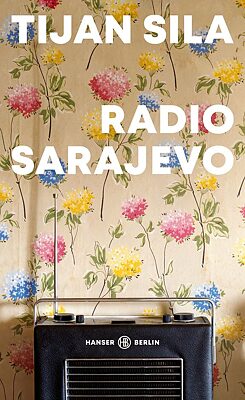Cherrypicker
Childhood Under Fire
The Bosnian War: unsettling, brutal, forgotten by many today. Tijan Sila brings it back to life in his memoir. Years of violence, anger and grief lie between the siege of his native Sarajevo and his family’s flight to Germany.
By Marit Borcherding
The cover of Radio Sarajevo looks somehow nostalgic with bright flowers on a nicotine yellow wallpaper background and an old-fashioned portable radio as an eye-catcher. But on the very first page of this reality-based work, it becomes clear that these are no heart-warming stories of a carefree Balkan childhood. The first lines of the prologue contain the words: bombs, explosion, alarm systems, panic, death, shadows, first day of war, black smoke. One minute the ten-year-old narrator is listening to pop songs by David Bowie on the radio, the next he is rushing into the cellar with the rest of the household seeking shelter while the world seems to be exploding around him. Hardly anyone could be catapulted out of their childhood cosmos more abruptly. “The war is here,” we are told at the end of the prologue. In the following 17 chapters, the protagonist tells us what this means in a way that is both sober and more unsparing than we would care to endure.
No more tears
The author, born in Sarajevo in 1981, begins his book, his fourth, with the first hours of the war. The child narrator, his parents, a professor of library science and a lecturer in German studies who is working on her doctorate, other family members and the neighbourhood are confronted out of nowhere with the sound of bombs and rocket fire, to which they react in fear and shock, panic-stricken and without a plan. The boy’s first night in the cellar ends in a crying fit. Hardly anyone can offer comfort and assurance, especially not his academic parents. He gives the reader a glimpse of the psychological price he will pay. One of many, for if the boy initially endures the nightly bombardments with tearless composure, only to cry when there is no more shooting, this soon changes. “It was like that for the first two or three months of the war, until habituation set in and I stopped crying – for the next fifteen years. [...] This act of self-control gave me a strange pleasure. It’s true that people become accustomed to every agony. But it’s also true that weaning oneself off it again is torture.”A shattered future
In this way, Tijan Sila repeatedly looks at the future of his characters while describing what they are experiencing and suffering in the beginning of the war. Using this literary device, he regularly undermines any wishes his readers may have that everything will end well for them despite the suffering they have endured. On the contrary, hope is rarely glimpsed in this book, a heroic narrative, which usually makes for enjoyable reading, is distinctly lacking. “The war would never end for my mother,” we learn on page 33, “in 2008 I would have to commit her [...] to a psychiatric ward. The expert from the health authority would write in the assessment report that the sediment of her psychosis was unprocessed war trauma. In 1992, no one in Sarajevo knew that a war never ends. All we knew was that we were running out of food ...”Beginning on day 1, the state of siege and war holds countless other horrors in store for the narrator, his family and all the other suburban residents: looting, barricades with burning garbage containers, exploding grenades right outside the front door, break-ins, increasing neglect of the neighbourhood, and escape into drug addiction, also among adolescents. Even the exchanges between neighbours and friends, between schoolchildren and teachers, are marked by violence in words and in deeds, and often long before the start of the war. An abyss whose depth the narrator can only guess at first. “Sarajevo seemed to me like a black forest, death as a hunter, and I felt for the first time what I only managed to put into words years later […]: I felt that to live meant above all to endure horror.” It goes without saying that for a ten-year-old, this realisation is an enormous challenge.
Without end
The action doesn’t even have to be set on a war front in the classic sense; the devastation of war is made very clear in the limited view of the narrator’s immediate surroundings. Perhaps even more so, because repression and violence destroy even the most intimate shelters and leave people alone no matter how old and in need of help they are. Yet alongside all the direct and stark descriptions of the rampant atrocities, Tijan Sila also presents the bizarre and comical moments of the anarchic conditions of everyday life in a civil war. The boys swap porn magazines for sweets and cola from the blue helmet soldiers. The destroyed city sometimes seems like a highly dangerous adventure playground. However, the reader only breathes a sigh of relief at the beginning of the epilogue and the sentence: “We left Sarajevo in 1994.” We already learned that this did not bring a happy ending for the narrator’s parents, and the narrator is repeatedly caught up in the destructive events. After many years, he travels back to his hometown for an appearance at a literary festival and meets up with a childhood friend. “You probably can’t imagine it,” he says to him at the end of their meeting, “but the war never ended.” “You’re wrong,” replies the narrator, “I know exactly what you mean.” We now know too, thanks to Tijan Sila’s impressive storytelling.
Tijan Sila: Radio Sarajevo
Berlin: Hanser Berlin, 2023. 176 p.
ISBN: 978-3-446-27726-7
You can find this title in our eLibrary Onleihe.

